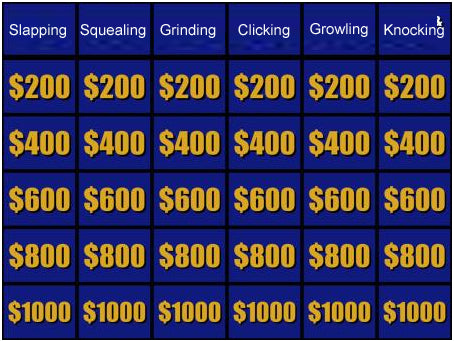Slapping, squealing, grinding, chriping, clicking, growling, knocks and muffled bells
What are; 'sounds my engine makes'

We field a lot of questions and are often asked to diagnose engine issues on the telephone. Here is a list for you to chase down the cause of the sound emanating from your engine.
Send more in if you have them and we'll keep adding to the list
|
Sound |
Possible Cause |
|
Clicking sound that usually quiets down as you raise the engine RPM or a double knock sound |
Valve and hydraulic lifter or a lack of oil and excessive clearance between the piston pin and the piston |
|
Whine |
If heard when turning, check the power steering fluid as lower levels may cause this. |
|
Pinging or rattling when accelerating the vehicle |
Air/fuel mixture in the engine cylinder being ignited prematurely by the heat of compression as the piston is moving up on the compression stroke |
|
Growling |
Growling is usually due to a faulty bearing in the tensioner pulley, an accessory component, or an idler pulley - if used |
|
Screech or high pitch whining |
A bearing (fan belt idler pulley, alternator pulley, etc.) can make screeching or whining noises |
|
Chirping |
Chirping is a result of belt vibration. This can occur due to improperly aligned pulleys, damp or wet conditions, and/or belt glazing. Minor pulley misalignment can result from excessive manufacturing tolerances or installation errors. |
|
Knock that is heard towards the bottom of the engine |
Connecting rod noise is caused by excessive clearance between the crankshaft and the connecting rod bearing surface |
|
Rumbling or thumping sound deep in the engine when accelerating |
Crankshaft bearing noise due to worn surfaces or possibly from low oil pressure |
|
Muffled bell sound or a hollow clatter deep in the engine and is more noticeable when the engine is cold |
Piston slap caused by excessive clearance between the piston skirt and the cylinder wall |
|
Squealing (often heard at engine startup, sudden acceleration, air conditioning turn-on, or during a U-turn) |
Typically caused by belt slippage due to improper tension and/or a badly glazed belt. Serpentine belt systems typically employ a spring loaded belt tensioning pulley. Sometimes these can just go soft. |
|
Gravel in engine |
Cavitation in the water pump |
We have removed an Alex Trebeck image due to scum sucking POS copyright trolls extorting money and misusing the law. This is a parody of an image and serves to educate people out engine noise. We are not interested in selling quiz shows or "engine sounds" just information.


Comments on this post (0)